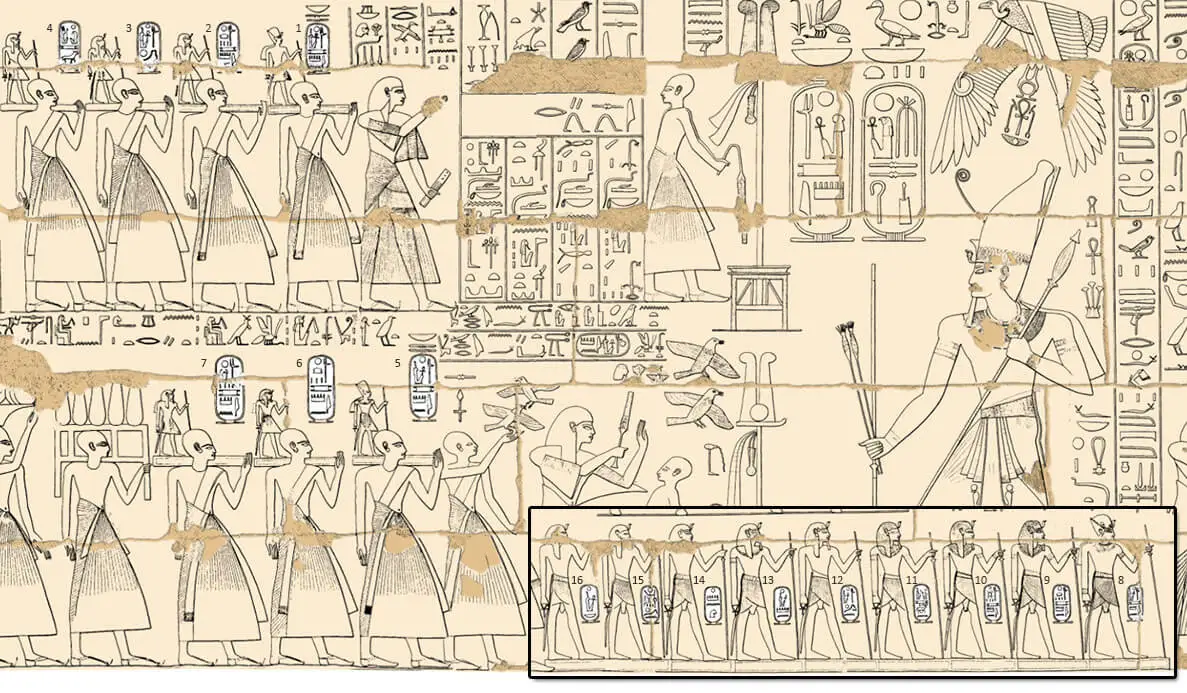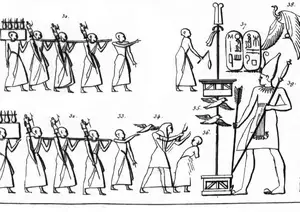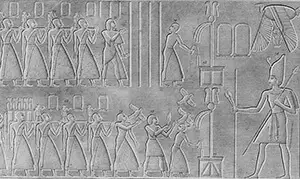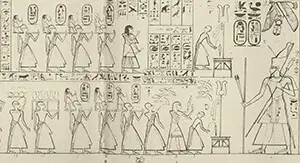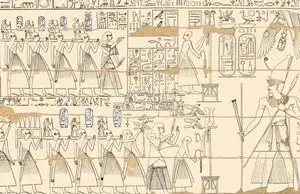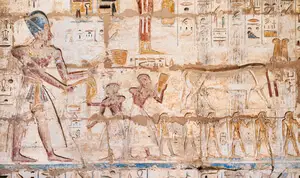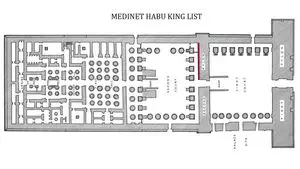The Temple of Medinet Habu is the mortuary temple of Ramesses III on the West bank at Thebes in Upper Egypt.
Ramesses III copied many scenes directly from those at the Ramesseum, which is abundantly clear as there are many almost identical scenes throughout the temple complex. The procession of the Festival of Min is no exception, it is very similar to the Ramesseum scenes. The reliefs are clear with much of the colouring still intact, especially considering that the temple is about 3200 years old. The scenes depict episodes from the Festival of Min, celebrating the continued rule of the king. A large ceremonial procession brought offerings to a figure of Min, the god of fertility and harvests, presided over by Ramesses III himself. Statues of venerated ancestors were also carried along the procession, in all there are sixteen cartouches with the names of nine kings.
The scene is located in the upper register on the east wall of the Second pylon in the Second Court and was first published by Vivant Denon in 1802 after his return from Napoleon’s expedition to Egypt in 1798-1801. It was a very crude sketch of the procession and only the hieroglyphs of Ramesses III are shown. When Description de l’Égypte was published ten years later it improved upon Denon’s sketch, but omitted the hieroglyphs completely. It was not until Wilkinson’s edition in 1837 that the actual hieroglyphs were shown. Champollion improved upon the details in 1845, which was followed a few years later by Lepsius in 1849. Henri Gauthier examined the similarities to the Ramesseum scene including low quality photographs in 1931. All of the 19th-century editions have omissions and errors, but the Epigraphic Survey published the definitive (and complete) rendering of the scenes in 1940.
Siptah and Amenmesse of the Nineteenth Dynasty are both excluded, as is Tausret who was ousted by Ramesses III’s father Setnakht. Exactly like at the Ramesseum, the scenes can be found in the second court, in the upper register of the second eastern pylon.
Names of the pharaohs being honoured
The justice of Ra is powerful, chosen of Ra
Holy are of the manifestations of Ra, chosen of Ra
Gallery
A small collection of drawings featuring the Ramesseum
Bibliography
- Vivant, Dominique., 1802. Voyage dans la Basse et la Haute Égypte, pendant les campagnes du général Bonaparte. Paris: plate 134.
- Description de l’Égypte., 1809-. Vol. II, Planches: Antiquités. Paris: pl. 11
- Wilkinson, John Gardner., 1837. The manners and customs of the ancient Egyptians. London: Pl. 76.
- Rosellini, Ippolito., 1844. I monumenti dell'Egitto e della Nubia. Vol 4.3 culto.. Pisa: pls. 85-86
- Champollion, Jean François., 1845. Monuments de l’Égypte et de la Nubie. Vol. III. Paris: pls. 210-214
- Lepsius, Karl Richard., 1849. Denkmaeler aus Aegypten und Aethiopien, Vol. III. Berlin: pls. 212-213
- Porter & Moss., 1972. Topographical Bibliography. II2. Oxford: 499-500 (nos. 96-98)
- Gauthier, Henri., 1931. Les fêtes du dieu Min. Recherches d’archéologie, de philologie et d’histoire, 2. Cairo.
- The Epigraphic Survey., 1940. Medinet Habu, Volume IV Festival Scenes of Ramesses III. OIP, 51. Chicago: pls. 203 & 206
- Kitchen, K. A., 1983. Ramesside Inscriptions, V. Oxford: 205:12-13, 209:11-12

